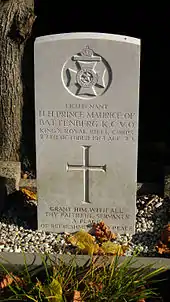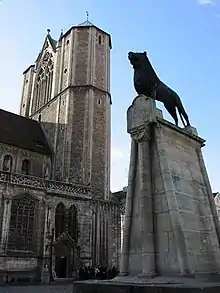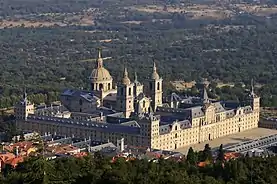These burial places of British royalty record the known graves of monarchs who have reigned in some part of the British Isles (currently includes only the monarchs of Scotland, England, native princes of Wales to 1283, or monarchs of Great Britain, and the United Kingdom), as well as members of their royal families.
Monarchs of England (to 1603)
Pre-conquest
| Name | Death | Place of burial | Image |
|---|---|---|---|
| Egbert | 839 | Old Minster, Winchester Bones now thought to be in one of the six mortuary caskets in Winchester Cathedral |
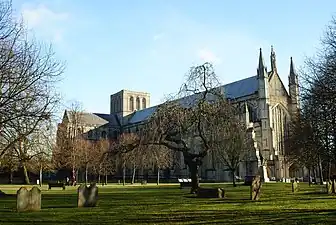 |
| Æthelwulf | 855 | Steyning Church, then the Old Minster, Winchester Bones now thought to be in one of the six mortuary caskets in Winchester Cathedral |
|
| Æthelbald | 860 | Sherborne Abbey, Dorset |  |
| Æthelbert | 866 | ||
| Æthelred I | 871 | Wimborne Minster, Dorset |  |
| Alfred the Great | 899 | Originally Old Minster, Winchester Moved to New Minster then Hyde Abbey Current whereabouts are unknown |
 |
| Edward the Elder | 924 | New Minster, Winchester Moved to Hyde Abbey Current whereabouts are unknown |
|
| Æthelstan | 939 | Malmesbury Abbey, Wiltshire | 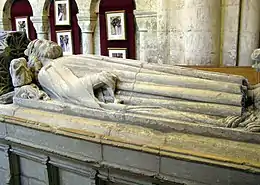 |
| Edmund I | 946 | Glastonbury Abbey | 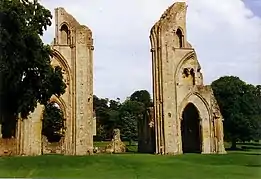 |
| Eadred | 955 | Old Minster, Winchester Bones now thought to be in one of the six mortuary caskets in Winchester Cathedral |
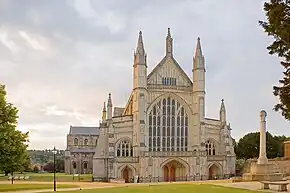 |
| Eadwig (Edwy) | 959 | Bones now thought to be in one of the six mortuary caskets in Winchester Cathedral |  |
| Edgar | 975 | Glastonbury Abbey | 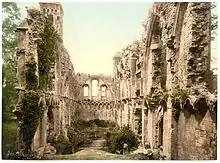 |
| Edward the Martyr | 978 | Shaftesbury Abbey, Dorset Bones reputed to be his now reside in the Church of St. Edward the Martyr, Brookwood. |
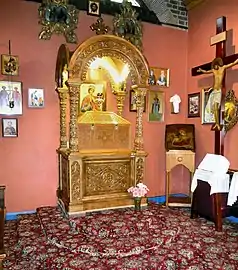 |
| Æthelred the Unready | 1016 | Old St Paul's Cathedral Tomb lost in the Great Fire of London, referenced as such on a plaque outside the crypt of the present church. |
 |
| Edmund Ironside | 1016 | Glastonbury Abbey |  |
| Sweyn Forkbeard | 1014 | Roskilde Cathedral, Denmark | 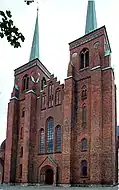 |
| Cnut the Great | 1035 | Old Minster, Winchester Bones now thought to be in one of the six mortuary caskets in Winchester Cathedral |
 |
| Harold Harefoot | 1040 | St Clement Danes, London |  |
| Harthacnut | 1042 | Bones now thought to be in one of the six mortuary caskets in Winchester Cathedral |  |
| Edward the Confessor | 1066 | Westminster Abbey. Edward was the first king buried in the church. In the 13th century, Henry III had his remains transferred to a shrine in the rebuilt abbey, in the new chapel named after him. |  . . |
| Harold Godwinson | 1066 | Waltham Abbey, Essex (by repute) |  |
Post-conquest
| Name | Death | Place of burial | Images |
|---|---|---|---|
| William I | 1087 | Abbaye-aux-Hommes, Caen, Normandy (remains destroyed in 1562, 1793) |  |
| William II | 1100 | Winchester Cathedral |  |
| Henry I | 1135 | Reading Abbey, Berkshire His remains were lost after the ruin of the abbey.[1] |
  |
| Stephen | 1154 | Faversham Abbey, Kent The abbey was demolished after the Reformation and Stephen's grave was destroyed. |
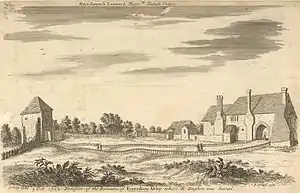 |
| Matilda | 1167 | Rouen Cathedral, Normandy, France Remains transferred from Bec Abbey in Normandy. |  |
| Henry II | 1189 | Fontevraud Abbey, Anjou, France The grave no longer exists and was probably destroyed during the French Revolution. The effigies survived. |
 |
| Richard I | 1199 |  | |
| John | 1216 | Worcester Cathedral | 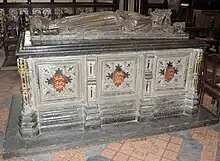 |
| Henry III | 1272 | Edward the Confessor's Chapel, Westminster Abbey[2] | 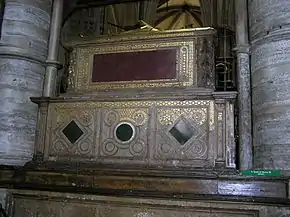 |
| Edward I | 1307 | 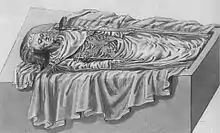 | |
| Edward II | 1327 | Gloucester Cathedral | 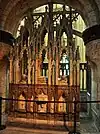 |
| Edward III | 1377 | Edward the Confessor's Chapel, Westminster Abbey[3] |  |
| Richard II | 1400 | King's Langley Priory (reburied Edward the Confessor's Chapel, Westminster Abbey 1413) | 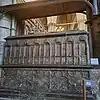 |
| Henry IV | 1413 | Canterbury Cathedral | 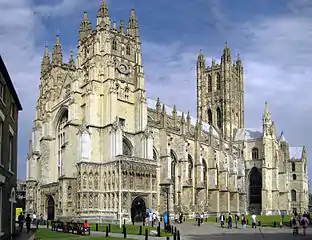 |
| Henry V | 1422 | Westminster Abbey | .jpg.webp) |
| Henry VI | 1471 | Windsor Castle (reburied in St George's Chapel 1484) |  |
| Edward IV | 1483 | St George's Chapel at Windsor Castle |  |
| Edward V | ?1483 | Traditionally believed to have been murdered and buried secretly in the Tower of London. Bones presumed to be his and those of his brother Richard, Duke of York were unearthed in the Tower in 1674 and re-buried in Westminster Abbey four years later. | |
| Richard III | 1485 | Leicester Cathedral Originally buried across the street in Greyfriars, but the original tomb was lost when the friary was demolished in 1538. The remains of Richard III were recovered by an archaeological dig in 2012 and re-interred in 2015.[4] |
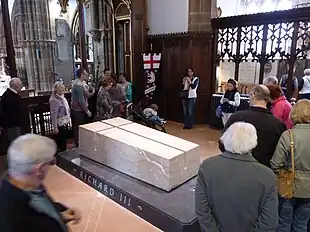 |
| Henry VII | 1509 | Henry VII Lady Chapel, Westminster Abbey[5] | 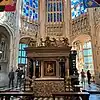 |
| Henry VIII | 1547 | St George's Chapel at Windsor Castle | 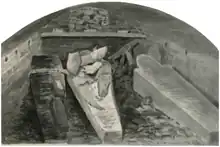 |
| Edward VI | 1553 | Henry VII Lady Chapel, Westminster Abbey |  |
| Jane | 1554 | St Peter ad Vincula, Tower of London | 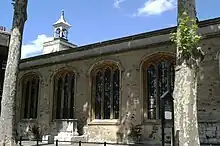 |
| Mary I | 1558 | Henry VII Lady Chapel, Westminster Abbey[5] | |
| Elizabeth I | 1603 | _2013.jpg.webp) | |
Monarchs of Scotland (to 1603)
Native princes of Wales (to 1283)
| Name | Death | Place of burial | Image |
|---|---|---|---|
| Owain Gwynedd | 1170 | Bangor Cathedral | |
| Dafydd ab Owain Gwynedd (prince of north Wales only) | 1203 | England? | |
| The Lord Rhys (prince of south Wales only) | 1197 | St. David's Cathedral | |
| Llywelyn ab Iorwerth | 1240 | Body interred at Aberconwy Abbey Later (apparently) removed to Maenan Abbey; sarcophagus now found at parish church of Llanrwst |
|
| Dafydd ap Llywelyn | 1246 | Body interred at Aberconwy Abbey; current whereabouts unknown |
|
| Llywelyn ap Gruffudd | 1282 | Cwmhir Abbey | |
| Dafydd ap Gruffudd | 1283 | Hanged, drawn and quartered at Shrewsbury | |
Monarchs since 1603
(of England, and Scotland (1603–1707); of Great Britain (1707–1801); of United Kingdom (1801–present))
| Name | Death | Place of burial | Image |
|---|---|---|---|
| James VI and I | 1625 | Henry VII Chapel, Westminster Abbey[5] | |
| Charles I | 1649 | St George's Chapel, Windsor Castle |  |
- Interregnum. As Lords Protector the Cromwells served as heads of state and exercised monarchical power
| Name | Death | Place of burial | Image |
|---|---|---|---|
| Oliver Cromwell (Protector) | 1658 | Tyburn, London. Moved from Westminster Abbey in 1660 and dumped in a pit after posthumous execution. Reputed head buried at Sidney Sussex College in 1960. | |
| Richard Cromwell (Protector) | 1712 | All Saints Church, Hursley, Hampshire | |
- Restored monarchy
| Name | Death | Place of burial | Image |
|---|---|---|---|
| Charles II | 1685 | Henry VII Chapel, Westminster Abbey[5] | |
| James II and VII | 1701 | Chapel of St Edmund, Church of the English Benedictines, Rue St. Jacques, Paris
(lost at the French Revolution)[15] |
|
| Mary II | 1694 | Henry VII Chapel, Westminster Abbey[5] | |
| William III and II | 1702 | ||
| Anne | 1714 | ||
| George I | 1727 | Chapel of Leine Castle in Hanover, Germany; moved from the crypt to the Welfenmausoleum at Herrenhausen on 5 December 1957.[16][17] He was the last British monarch buried outside of the British Isles. |  |
| George II | 1760 | Henry VII Chapel, Westminster Abbey[5] | |
| George III | 1820 | St George's Chapel, Windsor Castle | |
| George IV | 1830 | ||
| William IV | 1837 | ||
| Victoria | 1901 | Royal Mausoleum, Frogmore, Windsor | 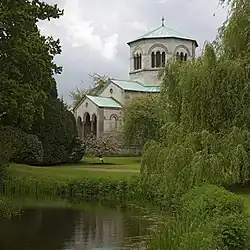 |
| Edward VII | 1910 | St George's Chapel, Windsor Castle |  |
| George V | 1936 |  | |
| Edward VIII | 1972 | Royal Burial Ground, Frogmore, Windsor | 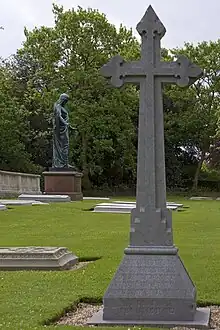 |
| George VI | 1952 | King George VI Memorial Chapel, St George's Chapel, Windsor Castle |  |
| Elizabeth II | 2022 | ||
Jacobite pretenders
| Name | Death | Place of burial | Image |
|---|---|---|---|
| James Stuart ("Old Pretender")
Charles Edward Stuart ("Bonnie Prince Charlie") |
1766
1788 1807 |
St. Peter's Basilica, Vatican (see also Monument to the Royal Stuarts) | 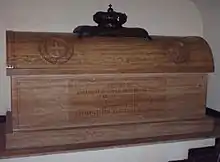
|
Other Royal burials (by place)
Sources
- Burial Places of the Kings & Queens of Britain britannia.com (Accessed 20 June 2007 – NB contains errors)
References and notes
- ↑ "A search for bones of Henry I is planned in Reading". BBC News. 24 March 2015. Retrieved 26 March 2015.
- ↑ Westminster Abbey Website (accessed 30 April 2015)
- ↑ Westminster Abbey Website (accessed 30 April 2015)
- ↑ Burns, John F. (26 March 2015). "Richard III Gets a Kingly Burial, on Second Try". The New York Times.
- 1 2 3 4 5 6 Abbey Tour - The Lady Chapel Westminster Abbey website (accessed 20 June 2007)
- 1 2 Eochaid & Giric Undiscovered Scotland (accessed 20 June 2007)
- ↑ Ross, David R (2003). Passion for Scotland. Dundurn. p. 37. ISBN 1842820192.
- ↑ Malcolm III Canmore Undiscovered Scotland (accessed 20 June 2007)
- ↑ William I Undiscovered Scotland (accessed 20 June 2007)
- ↑ Alexander II Undiscovered Scotland (accessed 20 June 2007)
- ↑ John Balliol Undiscovered Scotland (accessed 20 June 2007)
- ↑ Robert II Undiscovered Scotland (accessed 20 June 2007)
- ↑ James III Undiscovered Scotland (accessed 20 June 2007)
- ↑ James IVUndiscovered Scotland (accessed 20 June 2007)
- ↑ See main article on James: Miller, 240; Waller, 401; MacLeod, 349. MacLeod and Waller say all of James's remains were lost in the French Revolution. The English Illustrated Magazine's article on St. Germain from September 1903 says parts of his bowel interred at the parish church of St. Germain-en-Laye were rediscovered in 1824 and reburied. Hilliam, 205. Hilliam disputes that his remains were either scattered or lost, stating that when revolutionaries broke into the church, they were amazed at the body's preservation and it was put on public exhibition where miracles were said to have happened. Hilliam states that the body was then kept "above ground" until George IV heard about it and ordered the body buried in the parish church of St Germain-en-Laye in 1824.
- ↑ Helmut Knocke and Hugo Thielen (2007). Mausoleum, in Dirk Böttcher, Klaus Mlynek (Eds.) Hannover Kunst- und Kultur-Lexikon. Handbuch und Stadtführer. Springe: zu Klampen Verlag. ISBN 978-3-934920-53-8 (p.92)
- ↑ Weir, Alison (1996). Britain's Royal Families: The Complete Genealogy, Revised edition. Random House. pp. 272–276. ISBN 0-7126-7448-9.
- ↑ Westminster Abbey Website (Accessed 1 December 2014)
This article is issued from Wikipedia. The text is licensed under Creative Commons - Attribution - Sharealike. Additional terms may apply for the media files.




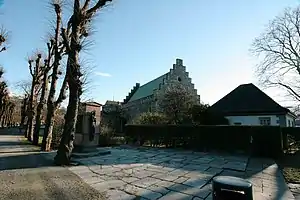

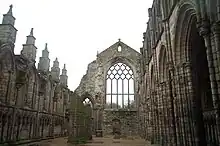
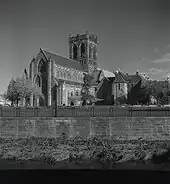
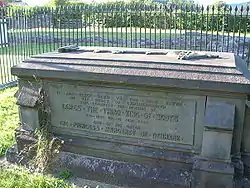
.jpg.webp)
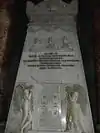
.jpg.webp)





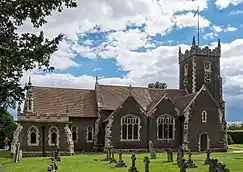
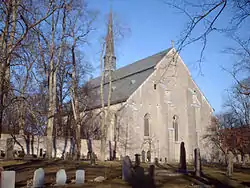
.jpg.webp)
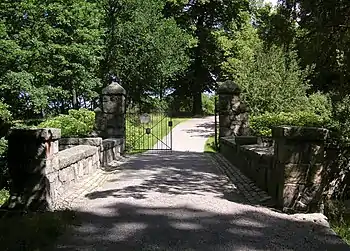
.jpg.webp)

